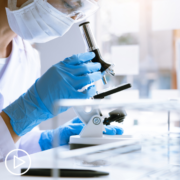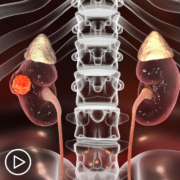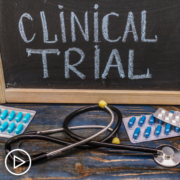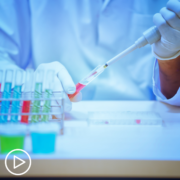Do AML Patients Receive Allo or Auto Stem Cell Transplant?
Do AML Patients Receive Allo or Auto Stem Cell Transplant? from Patient Empowerment Network on Vimeo.
What type of stem cell transplant do AML patients receive? Expert Dr. Sara Taveras Alam from UTHealth Houston explains stem cell transplant for AML care and advice to help patients locate a bone marrow donor match.
[ACT]IVATION Tip
“…encourage family members and friends to enlist on the national and international available donor registries. I believe that when a patient gets diagnosed with AML, everyone in their immediate circle wants to help, and I tend to see family members and friends offer their bone marrow for transplant purposes. The likelihood of a friend or a distant relative being a match is very low. We know that siblings may have a high chance of being a match, parents or kids may be a half-match by definition, so there’s a higher chance of some unrelated person on the registry being a match to the patient than a distant relative or friend.”
Related Resources:

|

Advancing Equity | Research Initiatives in AML Disparities Among Black and Latinx Populations |

How Do AML Patients and Outcomes Differ by Population Groups? |
Transcript:
Lisa Hatfield:
When you mention a stem cell transplant, are those allogeneic stem cell transplants where they receive a donor’s stem cells, or are they the autologous where you take some of their stem cells at a certain point and then give them back to the patient?
Dr. Sara Taveras Alam:
So for patients with acute leukemia who require a stem cell transplant, it is an allogeneic stem cell transplant, so it does have to be a transplant from a matched donor, and the first pool of possible donors tend to be the patient’s siblings. If they have brothers or sisters from the same mom and dad, those are the possible first-line donors and are tested to see if they’re a match to the patient, and second to that, then the transplant institutions look into a donor registry.
So my activation tip for that question is to encourage family members and friends to enlist on the national and international available donor registries. I believe that when a patient gets diagnosed with AML, everyone in their immediate circle wants to help, and I tend to see family members and friends offer their bone marrow for transplant purposes. The likelihood of a friend or a distant relative being a match is very low.
We know that siblings may have a high chance of being a match, parents or kids may be a half-match by definition, so there’s a higher chance of some unrelated person on the registry being a match to the patient than a distant relative or friend. However, we could always pay it forward, and if we encourage our friends and family to enlist on these registries, it is very beneficial for our population.






